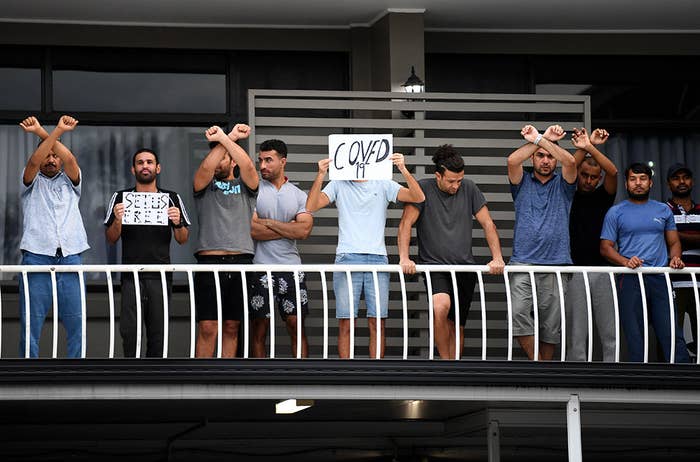
Immigrants whose visas were cancelled after they committed crimes have found an unlikely ally in 2020: the coronavirus.
A number of recent cases reveal that members of Australia's Administrative Appeals Tribunal, which reviews government decisions, are asking parties to address how the global COVID-19 pandemic plays into the question of whether a person's cancelled visa should be reinstated.
In several cases, the government has admitted that travel restrictions mean deportations are unlikely to happen in the near future. That means those without a visa will face longer spells in immigration detention — a factor that has weighed in favour of people getting their visas back.
Russell Medcalf, a 35-year-old New Zealand citizen, had his cancelled visa reinstated on April 9, with the tribunal finding that the effects of the coronavirus weighed in his favour.
Medcalf, who has lived in Australia since he was 17, had his visa cancelled in April 2018 because of criminal offences that meant he failed the "character test" in the Migration Act. They included driving offences, assault and a drug trafficking conviction that landed him a three-year jail sentence.
He applied for his visa to be reinstated, but a bureaucrat rejected his application in February. He appealed to the tribunal, where, at his hearing held over videoconference in late March, members asked for information on the impact of COVID-19.
Medcalf told the tribunal he was “very scared and worried” about being "stuck in detention indefinitely", because if COVID-19 came to detention it would “spread like wildfire”. The government had conceded that it was unlikely he would be deported in the immediately foreseeable future.
Detainees across Australia's immigration detention network have spoken out about their anxiety that the virus could easily spread in centres and hotels, brought in by guards or other staff from the outside world.
The government has so far rejected calls from doctors and advocates to release detainees to reduce the public health risk. Instead, it is taking extreme precautions, such as locking a man in a tiny cell for three days after he asked for Panadol because he was sore following three days of a heavy workout.
Medcalf also said he was worried about his prospects of finding work and housing in New Zealand. "With the COVID virus going on at the moment there'd be no jobs going," he said. He added that he does not know anyone there.
Medcalf was also worried that his Australian son would not be able to visit him in New Zealand if borders were closed.
Senior tribunal member Dr Michelle Evans-Bonner found that the pandemic meant Medcalf would likely be detained for longer than he otherwise would have been.
It would also add to his difficulties in re-establishing himself in New Zealand, she found. “The economic uncertainty of the pandemic may impact on [Medcalf’s] ability to find employment and on [his] ability to access support services to assist him to resettle in New Zealand and to find housing, although the extent of this impact is uncertain,” the tribunal wrote.
The extra time he would spend in detention and the difficulties he would face back in New Zealand because of the pandemic weighed in favour of his visa being reinstated, the tribunal found. It was also found it would be in his son's strong interest to have his father present during his formative years.
The coronavirus was taken into account as early as Feb. 25, when a 29-year-old Chinese citizen argued that he risked dying from the virus if deported to China. In late February, the virus was sweeping through China and infections in Italy, Iran and South Korea were increasing.
The man, who was known as FRVT in the tribunal, had his visa cancelled after he committed serious drug offences.
He told the tribunal the coronavirus outbreak in China was one reason his visa should be reinstated, on top of his unwell mother living in Australia, his relationship with his partner’s son in Australia, and the risk that he would face the death penalty in China because of his drug offending.
Tribunal member Tigiilagi Eteuati agreed that the risk of coronavirus infection was higher in China than in Australia, but that the number of infections was relatively small and that the man came from a province far away from the epicentre in Wuhan.
The tribunal was relatively optimistic about the progress of the virus, speculating that travel restrictions would last "a matter of months, not years", and pointing to the "drastic steps" the Chinese government had taken to reduce the spread of the virus, quarantine patients, develop testing kits and produce a vaccine.
Nevertheless, the tribunal found it was not reasonably practicable for the man to be deported to China because of Australia's travel restrictions, which would mean "prolonged" but not "indefinite" detention.
That prolonged detention, the risk that he could contract the virus in China, and the negative impact on the Chinese economy weighed in his favour, the tribunal said.
Similar issues have come up in at least two other cases.
In one, brought by an Indonesian man with Australian children, the tribunal accepted that he could face a prolonged period in detention due to COVID-19 travel restrictions, and said that was one factor weighing against cancelling the visa. His visa was reinstated.

